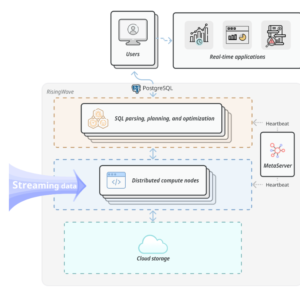

(wanpatsorn/Shutterstock)
Only the most advanced companies have overcome the technical complexity involved with processing streaming data in real time. One of the vendors aiming to reduce this complexity and make stream data processing available to the masses is RisingWave Labs, which today announced $36 million in financing.
The early days of stream data processing brought us stand-alone systems that were capable of acting upon vast streams of data, and doing so with low latency and reliability. Stream processing frameworks like Apache Storm made headway in addressing these challenges and led the way to more sophisticated frameworks like Apache Flink and others.
Things got significantly more complex when companies realized they needed to know something about the past to take the best action on the newest data, which necessitated the integration of stream processing frameworks with databases or data lakes, where the historical record lived as persisted data. Architectural blueprints, such as the Lambda and Kappa architectures, were proposed to address this unique challenge, but the technical complexity in keeping these dual-path systems running are immense.
Today we’re seeing the emergence of a new category of product–the streaming database–aimed at solving this problem. Instead of running data through a dedicated stream processing framework like Storm or Flink, the backers of streaming databases think that all the data processing–including the business end of a streaming big data pipeline like Kafka, Kinesis, or Pulsar–can be handled by the SQL query engine contained in a relational database.

RisingWave is a Postgres-compatible database developed to process data streams in the cloud (Image courtesy RisingWave Labs)
That’s the approach taken with RisingWave, a new open source streaming database that emerged just over a year ago. Yingjun Wu, a former AWS and IBM engineer, created RisingWave as a cloud-native database with the goal of providing the bernefits of stream processing without the technical complexity inherent with stream processing frameworks.
“Existing open-source systems are very costly to deploy, maintain, and use in the modern cloud environment,” Wu, who is the CEO of RisingWave Labs, says in a press release today. “Our goal is not to build yet another streaming system that is 10X faster than existing systems, but to deliver a simple and cost-effective system that allows everyone to benefit from stream processing.”
Developed in Rust, RisingWave is a Postgres-compatible database can do many of the things that stream processing frameworks do, but within the context and control of a familiar relational database running in the cloud and the SQL language, according to Wu, who has a PhD from National University of Singapore and was also a visiting PhD at Carnegie Mellon University.
“[RisingWave] consumes streaming data, performs continuous queries, and maintains results dynamically in the form of a materialized view,” Wu says in a blog post earlier this year. “Processing data streams inside a database is quite different from that inside a stream computation engine: streaming data are instantly ingested into data tables; queries over streaming and historical data are simply modeled as table joins; query results are directly maintained and updated inside the database, without pushing into a downstream system.”
The open source project, which available on GitHub via an Apache 2.0 license, is being adopted by organizations for a range of uses, including real-time analytics and alerting; IoT device tracking; monitoring user activity; and online application data serving. The company, which changed its name from Singularity Data three weeks ago, recently unveiled the beta of a hosted commercial version of RisingWave; it’s slated to become generally available next year.
The $36 million in Series A funding announced today brings the San Francisco company’s total funding to $40 million. That funding will help RisingWave tackle the real-time processing opportunities available in both legacy and green-field applications, says Yu Chen, a partner with Yunqi Partners, which was one of the venture firms that led the Series A.
“There is no lack of tools to process data streams,” Chen states in a press release, “but RisingWave is one of the few designed as a database and can be easily plugged into a modern data stack to make real-time data intelligence a reality.”
Related Items:
Is Real-Time Streaming Finally Taking Off?
Developing Kafka Data Pipelines Just Got Easier
Can Streaming Graphs Clean Up the Data Pipeline Mess?
May 3, 2024
- IDC: Structured Database Workloads Drive Major IT Infrastructure Spending in Late 2023
- Oracle Database 23ai Brings the Power of AI to Enterprise Data and Applications
- Solodev Debuts Advanced AI Services to Boost Cloud-Based App Development
- Sigma Announces AI Toolkit for Business and Launches Sigma Actions to Support Custom Data Applications
- New Salesforce White Paper Tackles LLM Security Risks
May 2, 2024
- Informatica to Welcome Data and AI Visionaries at Informatica World 2024
- Tealium for AI Launches to Address Data Readiness and Governance Challenges in AI Projects
- Eviden to Launch Applied AI and Edge AI Training Center in Collaboration with NVIDIA and UMBC Training Centers
- Airbyte Introduces Comprehensive Partner Program to Enhance Data Movement Services
- Dremio Enhances SQL Engine Capabilities for Optimal Performance in Data Analytics
- Galileo Introduces Protect, a Real-Time Hallucination Firewall to Safeguard Enterprise Generative AI
- LakeChime: A Data Trigger Service for Modern Data Lakes
- Confluent Unveils New Capabilities to Apache Flink Including Freight Clusters for Cost-Effective Data Handling
- Satellogic Releases Open Dataset for AI Model Training
- Tableau and Databricks Expand Strategic Partnership
May 1, 2024
- Quantum Corporation Launches Quantum GO with New Subscription Model for Data Management
- Exovera Enhances exoINSIGHT with Advanced Data Exploration and Collection
- Predactiv Unveils New Platform for Enhanced Data Integration and Analysis
- Deloitte and Google Public Sector Introduce New GenAI Platform for Smarter Government Solutions
April 30, 2024
Most Read Features
Sorry. No data so far.
Most Read News In Brief
Sorry. No data so far.
Most Read This Just In
Sorry. No data so far.
Sponsored Partner Content
-
Get your Data AI Ready – Celebrate One Year of Deep Dish Data Virtual Series!
-
Supercharge Your Data Lake with Spark 3.3
-
Learn How to Build a Custom Chatbot Using a RAG Workflow in Minutes [Hands-on Demo]
-
Overcome ETL Bottlenecks with Metadata-driven Integration for the AI Era [Free Guide]
-
Gartner® Hype Cycle™ for Analytics and Business Intelligence 2023
-
The Art of Mastering Data Quality for AI and Analytics
Sponsored Whitepapers
Contributors
Featured Events
-
AI & Big Data Expo North America 2024
 June 5 - June 6Santa Clara CA United States
June 5 - June 6Santa Clara CA United States -
CDAO Canada Public Sector 2024
 June 18 - June 19
June 18 - June 19 -
AI Hardware & Edge AI Summit Europe
 June 18 - June 19London United Kingdom
June 18 - June 19London United Kingdom -
AI Hardware & Edge AI Summit 2024
 September 10 - September 12San Jose CA United States
September 10 - September 12San Jose CA United States -
CDAO Government 2024
 September 18 - September 19Washington DC United States
September 18 - September 19Washington DC United States


























